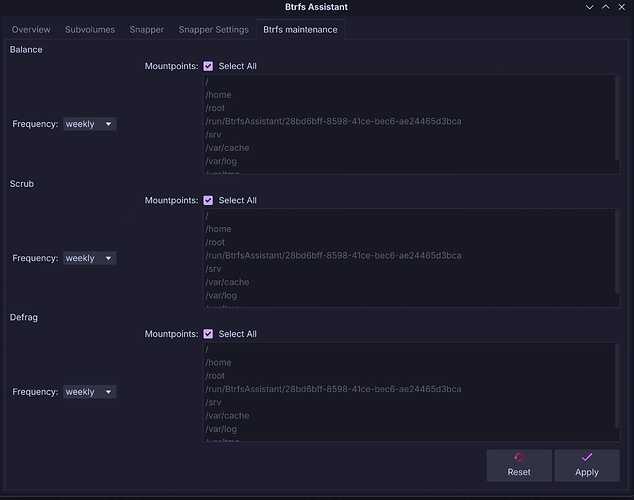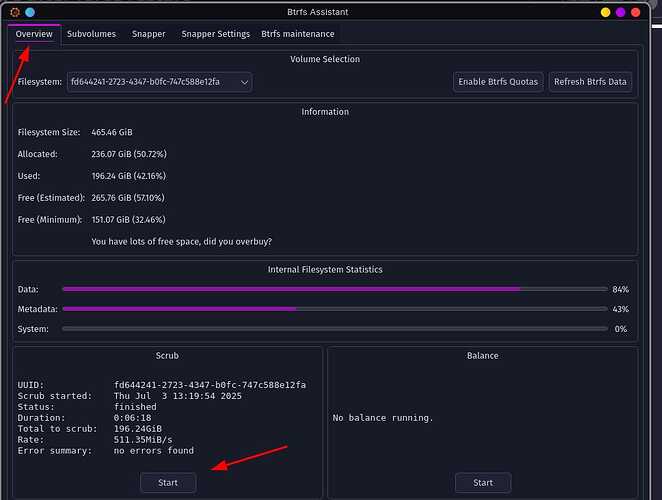Not sure why this happens, but almost every time I have to force restart, btrfs fails after that.
I mean I don’t know if I have to force-restart because btrfs fails, or if btrfs fails because I have to force-restart.
This happened to me a few times. Mostly because I was doing some random wrong things.
For example breaking my graphics drivers or trying to login to an X11 session without knowing what I was doing, I reached a point where the screen was black and I couldn’t even login to another tty.
The isue
So I had to force-restart with Alt+PrintScreen + R E I S U B.
Almost always after the system restarted, it wouldn’t go past the unlock-encryption stage.
Fix
So after a while I found a way to fix this and restore my system to a working state. Just in case anyone else needs them, here they are:
- Boot from live usb.
- Try to mount your partition.
- If you use encryption, open the device with
cryptsetup open - If you see an error about
superblockoropen_ctree failed: -5, proceed to the next step. - From the terminal, run
btrfs rescue zero-log /dev/nvme0n1or/dev/sdaXor/dev/mapper/your_crypt_open_device
After this, I can restart the computer and use it normally, or I can stay in the live usb environment and chroot into my install (after mounting my root garuda partition) if I want to fix any graphics-related issues that I caused previously.
Questions
- Does anyone know why btrfs keeps failing in this situation? Is it something that is known?
- And another question, am I risking anything by clearing out the broken log tree with
zero-log?
garuda inxi
System:
Kernel: 6.15.5-zen1-1-zen arch: x86_64 bits: 64 compiler: gcc v: 15.1.1 clocksource: tsc
avail: acpi_pm parameters: BOOT_IMAGE=/@/boot/vmlinuz-linux-zen
root=UUID=28bd6bff-8598-41ce-bec6-ae24465d3bca rw rootflags=subvol=@
vt.default_red=30,243,166,249,137,245,148,186,88,243,166,249,137,245,148,166
vt.default_grn=30,139,227,226,180,194,226,194,91,139,227,226,180,194,226,173
vt.default_blu=46,168,161,175,250,231,213,222,112,168,161,175,250,231,213,200 quiet
nvidia-drm.modeset=1 rd.luks.uuid=316249cc-7193-456f-89c1-f3206c9aa185
rd.luks.key=316249cc-7193-456f-89c1-f3206c9aa185=/.docs/2025.jpg:UUID=C676-0984
rd.luks.options=316249cc-7193-456f-89c1-f3206c9aa185=keyfile-timeout=10s
rd.luks.uuid=eafba6ea-1842-45d3-8af3-5ce617c6f478
resume=/dev/mapper/luks-eafba6ea-1842-45d3-8af3-5ce617c6f478 loglevel=3 ibt=off
Desktop: KDE Plasma v: 6.4.2 tk: Qt v: N/A info: frameworks v: 6.15.0 wm: kwin_wayland vt: 1
dm: SDDM Distro: Garuda base: Arch Linux
Machine:
Type: Laptop System: ASUSTeK product: ZenBook Pro Duo UX582HS_UX582HS v: 1.0
serial: <superuser required>
Mobo: ASUSTeK model: UX582HS v: 1.0 serial: <superuser required> uuid: <superuser required>
UEFI: American Megatrends LLC. v: UX582HS.303 date: 04/21/2022
Battery:
ID-1: BAT0 charge: 92.6 Wh (100.0%) condition: 92.6/92.6 Wh (100.0%) volts: 15.9 min: 15.9
model: ASUSTeK ASUS Battery type: Li-ion serial: N/A status: not charging cycles: 11
Device-1: hidpp_battery_0 model: Logitech MX Ergo Multi-Device Trackball serial: <filter>
charge: 50% (should be ignored) rechargeable: yes status: discharging
Device-2: hidpp_battery_1 model: Logitech Marathon Mouse/Performance Plus M705 serial: <filter>
charge: 50% (should be ignored) rechargeable: yes status: N/A
CPU:
Info: model: 11th Gen Intel Core i9-11900H bits: 64 type: MT MCP arch: Tiger Lake gen: core 11
level: v4 note: check built: 2020 process: Intel 10nm family: 6 model-id: 0x8D (141) stepping: 1
microcode: 0x56
Topology: cpus: 1x dies: 1 clusters: 8 cores: 8 threads: 16 tpc: 2 smt: enabled cache:
L1: 640 KiB desc: d-8x48 KiB; i-8x32 KiB L2: 10 MiB desc: 8x1.2 MiB L3: 24 MiB desc: 1x24 MiB
Speed (MHz): avg: 2694 min/max: 800/4900:4800 scaling: driver: intel_pstate
governor: performance cores: 1: 2694 2: 2694 3: 2694 4: 2694 5: 2694 6: 2694 7: 2694 8: 2694
9: 2694 10: 2694 11: 2694 12: 2694 13: 2694 14: 2694 15: 2694 16: 2694 bogomips: 79872
Flags: avx avx2 ht lm nx pae sse sse2 sse3 sse4_1 sse4_2 ssse3 vmx
Vulnerabilities: <filter>
Graphics:
Device-1: Intel TigerLake-H GT1 [UHD Graphics] vendor: ASUSTeK driver: i915 v: kernel
alternate: xe arch: Xe process: Intel 10nm built: 2020-21 ports: active: DP-2,DP-3,eDP-1
empty: DP-1,HDMI-A-2 bus-ID: 0000:00:02.0 chip-ID: 8086:9a60 class-ID: 0300
Device-2: NVIDIA GA104M [GeForce RTX 3080 Mobile / Max-Q 8GB/16GB] vendor: ASUSTeK
driver: nvidia v: 575.64.03 alternate: nouveau,nvidia_drm non-free: 550-570.xx+ status: current
(as of 2025-04; EOL~2026-12-xx) arch: Ampere code: GAxxx process: TSMC n7 (7nm)
built: 2020-2023 ports: active: none empty: HDMI-A-1 bus-ID: 0000:01:00.0 chip-ID: 10de:249c
class-ID: 0300
Device-3: IMC Networks USB2.0 HD UVC WebCam driver: uvcvideo type: USB rev: 2.0 speed: 480 Mb/s
lanes: 1 mode: 2.0 bus-ID: 3-9:4 chip-ID: 13d3:56eb class-ID: fe01 serial: <filter>
Display: wayland server: X.org v: 1.21.1.18 with: Xwayland v: 24.1.8 compositor: kwin_wayland
driver: X: loaded: modesetting,nvidia unloaded: nouveau,vesa alternate: fbdev,intel,nv dri: iris
gpu: i915 d-rect: 3840x5420 display-ID: 0
Monitor-1: DP-2 pos: primary,top model: ASUS PA279 serial: <filter> built: 2022 res:
mode: 3840x2160 hz: 60 scale: 150% (1.5) to: 2560x1440 dpi: 163 gamma: 1.2
size: 597x336mm (23.5x13.23") diag: 685mm (27") ratio: 16:9 modes: max: 3840x2160 min: 640x480
Monitor-2: DP-3 pos: bottom model: BOE Display 0x085f built: 2021 res: mode: 3840x1100 hz: 60
scale: 150% (1.5) to: 2560x733 dpi: 284 gamma: 1.2 size: 344x99mm (13.54x3.9")
diag: 358mm (14.1") modes: max: 3840x1100 min: 1920x550
Monitor-3: eDP-1 pos: middle model: Samsung 0x415f built: 2019 res: mode: 3840x2160 hz: 60
scale: 200% (2) to: 1920x1080 dpi: 284 gamma: 1.2 size: 344x194mm (13.54x7.64")
diag: 395mm (15.5") ratio: 16:9 modes: 3840x2160
API: EGL v: 1.5 hw: drv: intel iris platforms: device: 0 drv: iris device: 2 drv: swrast gbm:
drv: iris surfaceless: drv: iris wayland: drv: iris x11: drv: iris inactive: device-1
API: OpenGL v: 4.6 compat-v: 4.5 vendor: nvidia mesa v: 575.64.03 glx-v: 1.4 direct-render: yes
renderer: NVIDIA GeForce RTX 3080 Laptop GPU/PCIe/SSE2 memory: 7.81 GiB display-ID: :1.0
API: Vulkan v: 1.4.313 layers: 11 device: 0 type: integrated-gpu name: Intel UHD Graphics (TGL
GT1) driver: mesa intel v: 25.1.5-arch1.1 device-ID: 8086:9a60 surfaces: N/A device: 1
type: discrete-gpu name: NVIDIA GeForce RTX 3080 Laptop GPU driver: nvidia v: 575.64.03
device-ID: 10de:249c surfaces: N/A device: 2 type: cpu name: llvmpipe (LLVM 20.1.7 256 bits)
driver: mesa llvmpipe v: 25.1.5-arch1.1 (LLVM 20.1.7) device-ID: 10005:0000 surfaces: N/A
Info: Tools: api: clinfo, eglinfo, glxinfo, vulkaninfo de: kscreen-console,kscreen-doctor
gpu: gputop, intel_gpu_top, lsgpu, nvidia-settings, nvidia-smi wl: wayland-info x11: xdriinfo,
xdpyinfo, xprop, xrandr
Audio:
Device-1: Intel Tiger Lake-H HD Audio vendor: ASUSTeK driver: sof-audio-pci-intel-tgl
alternate: snd_hda_intel, snd_soc_avs, snd_sof_pci_intel_tgl bus-ID: 0000:00:1f.3
chip-ID: 8086:43c8 class-ID: 0401
Device-2: NVIDIA GA104 High Definition Audio vendor: ASUSTeK driver: snd_hda_intel v: kernel
bus-ID: 0000:01:00.1 chip-ID: 10de:228b class-ID: 0403
API: ALSA v: k6.15.5-zen1-1-zen status: kernel-api tools: alsactl,alsamixer,amixer
Server-1: sndiod v: N/A status: off tools: aucat,midicat,sndioctl
Server-2: PipeWire v: 1.4.6 status: active with: 1: pipewire-pulse status: active
2: wireplumber status: active 3: pipewire-alsa type: plugin 4: pw-jack type: plugin
tools: pactl,pw-cat,pw-cli,wpctl
Network:
Device-1: Intel Tiger Lake PCH CNVi WiFi driver: iwlwifi v: kernel bus-ID: 0000:00:14.3
chip-ID: 8086:43f0 class-ID: 0280
IF: wlo1 state: up mac: <filter>
Device-2: Realtek USB 10/100/1G/2.5G LAN driver: r8152 type: USB rev: 3.2 speed: 5 Gb/s
lanes: 1 mode: 3.2 gen-1x1 bus-ID: 4-1:2 chip-ID: 0bda:8156 class-ID: 0000 serial: <filter>
IF: enp0s20f0u1 state: up speed: 2500 Mbps duplex: full mac: <filter>
Info: services: NetworkManager, systemd-timesyncd, wpa_supplicant
Bluetooth:
Device-1: Intel AX201 Bluetooth driver: btusb v: 0.8 type: USB rev: 2.0 speed: 12 Mb/s lanes: 1
mode: 1.1 bus-ID: 3-14:7 chip-ID: 8087:0026 class-ID: e001
Report: btmgmt ID: hci0 rfk-id: 2 state: up address: N/A
RAID:
Hardware-1: Intel Volume Management Device NVMe RAID Controller driver: vmd v: 0.6 port: N/A
bus-ID: 0000:00:0e.0 chip-ID: 8086:9a0b rev: class-ID: 0104
Drives:
Local Storage: total: 1.82 TiB used: 593.27 GiB (31.8%)
SMART Message: Unable to run smartctl. Root privileges required.
ID-1: /dev/nvme0n1 maj-min: 259:0 vendor: Samsung model: SSD 980 PRO 2TB size: 1.82 TiB
block-size: physical: 512 B logical: 512 B speed: 63.2 Gb/s lanes: 4 tech: SSD serial: <filter>
fw-rev: 5B2QGXA7 temp: 39.9 C scheme: GPT
Partition:
ID-1: / raw-size: 410.15 GiB size: 410.15 GiB (100.00%) used: 111.25 GiB (27.1%) fs: btrfs
dev: /dev/dm-0 maj-min: 253:0 mapped: luks-316249cc-7193-456f-89c1-f3206c9aa185
ID-2: /boot/efi raw-size: 300 MiB size: 299.4 MiB (99.80%) used: 776 KiB (0.3%) fs: vfat
dev: /dev/nvme0n1p1 maj-min: 259:1
ID-3: /home raw-size: 410.15 GiB size: 410.15 GiB (100.00%) used: 111.25 GiB (27.1%) fs: btrfs
dev: /dev/dm-0 maj-min: 253:0 mapped: luks-316249cc-7193-456f-89c1-f3206c9aa185
ID-4: /var/log raw-size: 410.15 GiB size: 410.15 GiB (100.00%) used: 111.25 GiB (27.1%)
fs: btrfs dev: /dev/dm-0 maj-min: 253:0 mapped: luks-316249cc-7193-456f-89c1-f3206c9aa185
ID-5: /var/tmp raw-size: 410.15 GiB size: 410.15 GiB (100.00%) used: 111.25 GiB (27.1%)
fs: btrfs dev: /dev/dm-0 maj-min: 253:0 mapped: luks-316249cc-7193-456f-89c1-f3206c9aa185
Swap:
Kernel: swappiness: 133 (default 60) cache-pressure: 100 (default) zswap: no
ID-1: swap-1 type: partition size: 34.14 GiB used: 0 KiB (0.0%) priority: -2 dev: /dev/dm-1
maj-min: 253:1 mapped: luks-eafba6ea-1842-45d3-8af3-5ce617c6f478
ID-2: swap-2 type: zram size: 31.03 GiB used: 2.61 GiB (8.4%) priority: 100 comp: zstd
avail: lzo-rle,lzo,lz4,lz4hc,deflate,842 dev: /dev/zram0
Sensors:
System Temperatures: cpu: 77.0 C mobo: N/A
Fan Speeds (rpm): N/A
Info:
Memory: total: 32 GiB note: est. available: 31.03 GiB used: 20.43 GiB (65.8%)
Processes: 453 Power: uptime: 14h 51m states: freeze,mem,disk suspend: s2idle avail: deep
wakeups: 0 hibernate: platform avail: shutdown, reboot, suspend, test_resume image: 12.36 GiB
services: org_kde_powerdevil, power-profiles-daemon, upowerd Init: systemd v: 257
default: graphical tool: systemctl
Packages: 1772 pm: pacman pkgs: 1765 libs: 435 tools: octopi,paru,yay pm: rpm pkgs: 0
pm: flatpak pkgs: 7 Compilers: clang: 20.1.7 gcc: 15.1.1 alt: 14 Client: Unknown Client: electron
inxi: 3.3.38
Garuda (2.7.3-1):
System install date: 2025-06-26
Last full system update: 2025-07-09 ↻
Is partially upgraded: No
Relevant software: snapper NetworkManager dracut
Windows dual boot: No/Undetected
Failed units: afc.service

